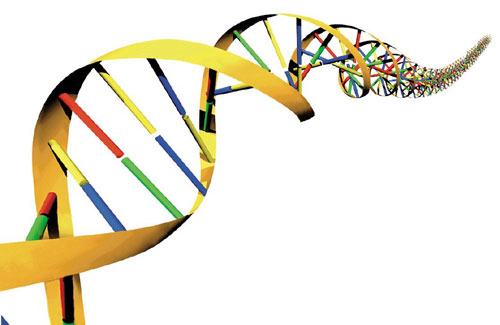Video: Can Computers Cure Disease?
In this video fro the Discovery Channel, Intel’s John Hengeveld describes how computers are replacing experimentation as a way to proceed down the scientific process of trial and error. Hengeveld wrote here recently about his experiences with a rare form of cancer and how researchers at Berkeley are using Big Data to save lives with the Cancer Genome Atlas.
Our thoughts go out to John, a very brave man indeed.
Numeddi Big Data Startup Wins Aptails Pharma Deal
 Stanford University spinoff NuMedii has landed a deal with Aptalis Pharma to apply its predictive “Big Data” technology. The companies aim to hunt down and advance drugs to combat gastrointestinal ailments and cystic fibrosis, which are two areas of focus at Aptalis. The deal boosts the commercial credentials of NuMedii, building on the startup’s role in a pair of papers last year that showed how its computational method could quickly pair approved and generic drugs with new potential uses against diseases.
Stanford University spinoff NuMedii has landed a deal with Aptalis Pharma to apply its predictive “Big Data” technology. The companies aim to hunt down and advance drugs to combat gastrointestinal ailments and cystic fibrosis, which are two areas of focus at Aptalis. The deal boosts the commercial credentials of NuMedii, building on the startup’s role in a pair of papers last year that showed how its computational method could quickly pair approved and generic drugs with new potential uses against diseases.NuMedii’s predictive Big Data discovery technology and its preclinical de-risking expertise are a great fit with Aptalis’ proven capabilities in formulation, clinical development and commercialization of new therapeutics,” said Gini Deshpande, PhD, NuMedii’s CEO and co-founder.
In an interview, Deshpande said that the company is hunting for additional deals with specialty pharma groups as well as partnerships that would enable the company to identify new uses for “shelved” compounds no longer in clinical development. Read the Full Story.
Big Data Sensors in Your Blood
 Over at the New York Times, Quentin Hardy writes that biological sensor technology will bring the power of Big Data analytics to healthcare providers.
Over at the New York Times, Quentin Hardy writes that biological sensor technology will bring the power of Big Data analytics to healthcare providers.Make no mistake about these companies’ ambitions. “Ultimately, we see ourselves as a part of the healthcare ecosystem,” Amar Kendale, MC10’s VP of market strategy and development, said in an e-mail. In this future, he wrote, “data will need to be shared seamlessly between customers, providers, and payers in order to reduce heathcare costs and simultaneously deliver the best possible care.” Proteus hopes to use anonymized data from its customers to understand health patterns over an entire population, presumably to revolutionize medicine.
Read the Full Story.
BGI Tackles DNA Big Data Using NVIDIA Tesla GPUs
 Today Nvidia announced the world’s largest genomics institute is using GPUs in in pioneering work of affordable personalized medicine. According to the company, BGI has slashed the time to analyze batches of DNA sequencing data from nearly four days to just six hours using a Tesla GPU-based server farm.
Today Nvidia announced the world’s largest genomics institute is using GPUs in in pioneering work of affordable personalized medicine. According to the company, BGI has slashed the time to analyze batches of DNA sequencing data from nearly four days to just six hours using a Tesla GPU-based server farm.We are drowning in the genome data that our high-throughput sequencing machines create every day,” said Dr. Bingqiang Wang, head of high performance computing from BGI. “GPU acceleration of our genome analysis applications enables our scientists to crunch through data and gain insights into bacteria, plants and humans faster than was ever possible. It offers the potential for researchers and healthcare professionals to identify highly effective and affordable individualized medicines and treatments.”
Speedups like this are considered critically important in determining chemical building blocks that make up a DNA molecule. With a goal of $1,000 genome, the genomics industry aims to make DNA clinical diagnostic tests as a practical component of patient care.
Read the Full Story.
Big Data’s Glory
 Juan Enriquez writes that the marriage Big Data and Biodata will enable a new kind of computing life form.
Juan Enriquez writes that the marriage Big Data and Biodata will enable a new kind of computing life form.AND BIG DATA is about to get much, much bigger, as we enter an era in which digital data merges with biology. This synthesis of codes takes the abstract world of digits and brings it back into the physical world. We of course know quite a bit about how life is expressed—in the four letters of DNA, in more than 20 amino acids, in thousands of proteins. We can copy life through cloning. Now we are beginning to be able to rewrite life, not just gene by gene, but entire genomes at a time. This is the difference between inserting a single word or paragraph into a Tolstoy novel (which is what biotechnology does) and writing the entire book from scratch (which is what synthetic biology does). It is far easier to fundamentally change the meaning and outcome of a novel, seed, animal or human organ if you write the entire thing.
Read the Full Story.
Video: Big Data, HPC, and Cancer
In this video, UC Berkeley’s David Patterson presents: Big Data, HPC, and Cancer. The talk was recorded at IDF 2011 in San Francisco. Download the PDF.
No comments:
Post a Comment